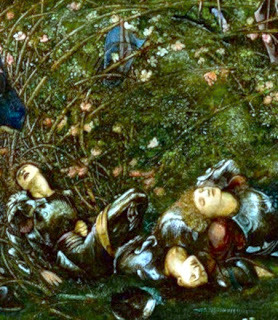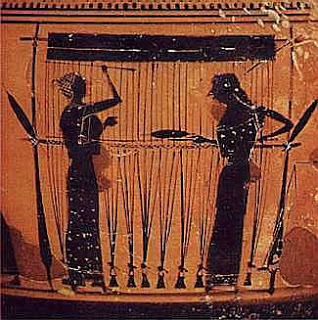Thomas Wharton's Blog, page 18
February 22, 2012
Fathomless Fire review
A review of The Fathomless Fire by Lucy Silag in the Globe & Mail.
The reviewer wishes there was a map in the book. I agree! I wanted to include a map in the first volume, The Shadow of Malabron, but the publishers nixed the idea for some reason. This isn't the first request I've had for a map. The very first post on this blog has a rather crude map of the city of Fable. During the writing of these books I've made many maps for myself, and I would like to include one with the third book. Maybe if I start a petition, the publishers will change their mind...
At any rate, my next post will be about maps and the Realm of Story.



The reviewer wishes there was a map in the book. I agree! I wanted to include a map in the first volume, The Shadow of Malabron, but the publishers nixed the idea for some reason. This isn't the first request I've had for a map. The very first post on this blog has a rather crude map of the city of Fable. During the writing of these books I've made many maps for myself, and I would like to include one with the third book. Maybe if I start a petition, the publishers will change their mind...
At any rate, my next post will be about maps and the Realm of Story.


Published on February 22, 2012 09:52
February 18, 2012
The Sleeper
The stories were changing. Everyone knew it, though no one could say how they knew. For these were not just the stories they had told or heard. These were their own stories. The stories of their lives.
 The queen gave birth to a baby girl with hair of pale gold. She was so lovely and perfect that the king wept with joy. He ordered a great feast for the christening. He invited everyone in the kingdom, and he took care to include the nine fey sisters, so that they might bless the child. Messengers were sent out to the haunted places where the sisters were known to dwell, with invitations worded in the most polite and gracious style, for that was how one always addressed such beings. The ninth fey sister was the oldest and most feared of all her kin, but it was not known where she lived, and no one greatly desired to find out. And so no invitation reached her.The feast was held with splendour and great joy, and when it was over, the eight fey sisters who had been invited came forward to bestow their gifts on the princess. A hush fell over the court as the strange women went one by one to the child's golden crib. The first sister, her face concealed by a mask of brambles, gave the child beauty. The second sister, her dark robe smoldering like embers, wished for the girl an angel's wit. The third, who was lame and dragging stones in her train, gave the gift of grace, so that the child should dance like a wave of the sea. And so it went, with the sisters bestowing everything a princess could wish for. When all but the youngest had given their gifts, the ninth fey sister suddenly appeared at the doors, unannounced and unwished for. Her robe was mottled like the skin of a plague victim, and she wore a necklace of finger-bones. The king and queen apologized to her, but she ignored them and walked without a word to the child's crib. I too have a gift for the child, she said. The oldest gift of all. She looked down at the sleeping princess, and in a soft voice said, Before her sixteenth year of life, this child will prick her finger on a spindle, and she will die. Without another word the ninth sister turned and left the palace. Everyone was terrified, and they all began to weep, but then the youngest of the fey sisters, who still had her gift to bestow, came forward. Her robe was the color of moonlight, and in her hair spiders spun their webs. -- My sister's enchantment cannot be wholly undone, she said, but I tell you that the princess shall not die. She shall but sleep, and all of you with her. --And only true love's kiss shall awaken her? the Queen asked, seeking some ray of hope in her distress. After all, the stories always said that true love's kiss worked on princesses who had fallen under enchantments. --It might have been so, once, said the youngest fey sister. If she knew anything more, she did not reveal it.
The queen gave birth to a baby girl with hair of pale gold. She was so lovely and perfect that the king wept with joy. He ordered a great feast for the christening. He invited everyone in the kingdom, and he took care to include the nine fey sisters, so that they might bless the child. Messengers were sent out to the haunted places where the sisters were known to dwell, with invitations worded in the most polite and gracious style, for that was how one always addressed such beings. The ninth fey sister was the oldest and most feared of all her kin, but it was not known where she lived, and no one greatly desired to find out. And so no invitation reached her.The feast was held with splendour and great joy, and when it was over, the eight fey sisters who had been invited came forward to bestow their gifts on the princess. A hush fell over the court as the strange women went one by one to the child's golden crib. The first sister, her face concealed by a mask of brambles, gave the child beauty. The second sister, her dark robe smoldering like embers, wished for the girl an angel's wit. The third, who was lame and dragging stones in her train, gave the gift of grace, so that the child should dance like a wave of the sea. And so it went, with the sisters bestowing everything a princess could wish for. When all but the youngest had given their gifts, the ninth fey sister suddenly appeared at the doors, unannounced and unwished for. Her robe was mottled like the skin of a plague victim, and she wore a necklace of finger-bones. The king and queen apologized to her, but she ignored them and walked without a word to the child's crib. I too have a gift for the child, she said. The oldest gift of all. She looked down at the sleeping princess, and in a soft voice said, Before her sixteenth year of life, this child will prick her finger on a spindle, and she will die. Without another word the ninth sister turned and left the palace. Everyone was terrified, and they all began to weep, but then the youngest of the fey sisters, who still had her gift to bestow, came forward. Her robe was the color of moonlight, and in her hair spiders spun their webs. -- My sister's enchantment cannot be wholly undone, she said, but I tell you that the princess shall not die. She shall but sleep, and all of you with her. --And only true love's kiss shall awaken her? the Queen asked, seeking some ray of hope in her distress. After all, the stories always said that true love's kiss worked on princesses who had fallen under enchantments. --It might have been so, once, said the youngest fey sister. If she knew anything more, she did not reveal it. The child grew into a bright and happy girl, beloved by all who knew her. The only time she was troubled was at night, when she would often have frightening dreams of a great black cloud that came marching across the land and covered the palace in darkness. She would wake with cries of fear, and her mother would comfort her, though the terror of what her daughter had dreamed filled the queen with foreboding. But as the years passed, and no sorrow or danger visited the kingdom, the king and queen came to believe they had escaped the eldest sister's pronouncement. They did not lift the ban against spinning and weaving, but now and then they would allow their daughter out of their sight for a brief time. At last, when the princess turned fifteen, they had so forgotten their fear that they set out on a royal tour through the kingdom, leaving the princess at home to amuse herself as she wished. The girl had rarely been allowed such freedom, and she roamed eagerly through the palace, looking into every room. The king and queen had not got far on their way when the queen called for the coach to stop. The king asked her what was wrong, and she looked at him with terror.-- We must go back, she cried. What were we thinking? We have gone to sleep.As the coach thundered back to the palace, the princess was climbing to the top of the tallest tower, which she had never visited before. In the uppermost chamber she found an old woman bent over a spinning wheel, rocking back and forth and humming softly to herself as the wheel spun. -- What's that you're doing? the girl asked. -- Spinning the thread of a tale, the old woman said with a toothless grin, and she offered to show the girl how it was done. -- That's not where tales come from, the girl said. -- Oh, no? the old woman said. And where do they come from, girl? -- They come from books, like the ones mother and father read to me at bedtime when I was little. The old woman's black eyes glittered. -- That may be so, she said, but they came first from a wheel like this, and an old woman like me. You don't believe it? Come here and I'll show you. Intrigued, the princess drew closer and unknowingly set her finger upon the sharp point of the spindle. She gave a cry and fell down as if dead upon the bed that stood close by. At that moment the royal coach was pulling in through the gates, and in an instant the king and queen and the coach driver and the horses and everyone else in the palace fell into a slumber. Everything went silent and still. The dogs in the yard stopped barking, the flies on the window panes no longer buzzed, the spits in the kitchen ceased turning, and even the fire curled up and went to sleep. The breeze that fluttered the palace flags died, and no leaf on any tree stirred.Years went by, and a great tangled hedge of thorns grew up around the palace, concealing it from the world outside. The people of that kingdom, no longer protected by their king and his knights, moved away to other lands. The countryside about the palace grew silent and barren.
 And still the princess and the court slept on. Many princes and brave knights came to the hedge, having heard the story of the sleeping beauty who lay within under an enchantment. They tried with all their might to get through the hedge, but when they had cut through part of the way, the thorns would close about them and hold them fast. One after another these brave young men died a lonely and miserable death. The years passed. The thorn hedge withered and crumbled to dust, and the sleeping court turned to stone.
And still the princess and the court slept on. Many princes and brave knights came to the hedge, having heard the story of the sleeping beauty who lay within under an enchantment. They tried with all their might to get through the hedge, but when they had cut through part of the way, the thorns would close about them and hold them fast. One after another these brave young men died a lonely and miserable death. The years passed. The thorn hedge withered and crumbled to dust, and the sleeping court turned to stone. Then a young traveler passed that way, a gatherer of stories and tales. He explored the silent palace, gazing in wonder at the stone statues of sleeping men and women. At last he climbed to the uppermost room in the tallest tower, where he found, beneath a thick canopy of cobwebs, the bed in which lay the sleeping princess. She alone in all the palace had not changed. Her skin was pale but glowed with life, her lips were red as ripe cherries, and her long, shining hair lay draped about her like a golden mantle. The traveler was moved to pity by the sight of this beautiful young woman alone in that desolate place. But he knew he was not the one meant to wake her. For he was a servant of the fathomless fire, and he saw that the young woman's story had been broken and devoured, like so many others, by the enemy he had pledged his life to defeat. But he could not leave the girl there, so he brought her back with him to his own country, and in the city where he lived, which was called Fable, she was placed in a soft silken bed and tended with care, in the hope that a way would someday be found to wake her. After a time those who cared for her noticed that whenever danger threatened the city, the princess would stir uneasily in her slumber, and mumble vague words of distress. So it was that the people of that city discovered that they had no more vigilant guardian than this sleeping girl.
The young traveler's name was Nicholas Pendrake. It was said by many (not by him) that if and when the girl finally awoke, Fable would face its darkest hour.

Published on February 18, 2012 15:57
February 12, 2012
Mages and Loremasters
Q. What's the difference between a mage and a loremaster?
A. In many parts of the Realm, mage is the title given to someone adept in spellcraft and divination who offers his or her service to monarchs, governments, or cities in need of magical assistance. Mages provide protection against supernatural threats. They predict the future (once in a while they actually get it right), they solve riddles and uncover arcane secrets, and they offer sage advice (sometimes it's actually good).
Many professional mages begin their training at the college of magecraft on the island of Kyning Rore. They then go on to have illustrious -- or infamous -- careers at royal courts.
 Sometimes mages who have different skills will band together as a guild or league and offer their services as a package deal. The people of Skald hired one such guild of mages, but the "deal" turned out to be a bad one for them. It has often been remarked that a kingdom was doing just fine until they hired a mage, and only then did all sorts of frightening and inexplicable things began happening. There are those who have even accused mages of stirring up or faking supernatural trouble and then stepping in to solve the problem, in order to trick the gullible.
Sometimes mages who have different skills will band together as a guild or league and offer their services as a package deal. The people of Skald hired one such guild of mages, but the "deal" turned out to be a bad one for them. It has often been remarked that a kingdom was doing just fine until they hired a mage, and only then did all sorts of frightening and inexplicable things began happening. There are those who have even accused mages of stirring up or faking supernatural trouble and then stepping in to solve the problem, in order to trick the gullible.A loremaster, in contrast, is someone who collects and tells stories. To some this seems like a far less important calling than that of a mage. But it mustn't be forgotten that the Realm is a world made of stories. Magic comes in many different shapes and forms in such a world, and in some stories there is no magic at all. So the power of any mage or wizard or sorcerer is limited by the "laws" of the story they are part of. Whereas a loremaster studies and delves into the deep source of all magic and all stories: the fathomless fire.
This is the power to shape Story itself, and mages who do not understand this power use it unwisely, with disastrous results. The hasty and ignorant tend to disregard the work of loremasters in favour of the dazzling spectacles that some mages can put on.
Q. Why doesn't the city of Fable have a resident mage or mage guild?
A. Some say this is because Fable isn't important or wealthy enough to afford a true mage as advisor. No mage who wanted to make a name for himself would bother setting up shop in such an out-of-the-way place. There would be no renown (or money) in it.
Others suggest Fable has no mage because they've never had need of one. Fable has a resident loremaster, Nicholas Pendrake, a toymaker by trade. He may in fact be the last of the loremasters, although his granddaughter Rowen is said to have inherited much of his gift for Story.

Published on February 12, 2012 14:22
February 5, 2012
The Broken Years
After the Great Unweaving unraveled the threads of Story, the Realm was plunged into a dark age during which much wisdom and knowledge was lost. No one can say how long these Broken Years lasted, because in that time, time itself was torn asunder.

The seasons no longer followed the yearly cycle that folk had lived by since time began. In some storylands winter refused to give way to spring. In others, summer lingered on and on, drying up rivers and withering crops. In many places the stars disappeared from the night sky, and the sun and moon rose at strange times and according to no rhythm or pattern that anyone could have faith in. Folk found that they had lost days, or years, out of their lives. Stories that had once been places of harmony and order descended into war, famine, and ruin. Many precious, irreplaceable stories, and storytellers, disappeared into silence.
It was during the Broken Years that the men and women known as loremasters first appeared in the Realm and fought against the darkness and the silence. They did not fight with swords or spears or devices of metal and fire. Their weapon was knowledge.
The loremasters journeyed through the Realm, learning all that they could of the ancient time of the Stewards, and sharing that lost wisdom with all they met. It was the loremasters who discovered the forgotten knot-paths that linked far-flung regions of the Realm, and the hidden refuges for travelers known as snugs. It was the loremasters who carried the light of the fathomless fire through the dark so that it did not utterly go out. And it was the loremasters who kept the memory of Story as it had once been, and could be again. With their tales and songs they rekindled hope, and mended the wounds of the Great Unweaving, and the shadows of fear and ignorance slowly drew back. It was said in later ages that these great loremasters told the disordered seasons into harmony once again, and even restored the sun and moon to their proper round in the heavens.
In the most lightless lands, the first star to reappear in the empty night sky was named the Waylight, in honour of the nameless loremaster who had gone about with his lantern, driving the creatures of darkness away and promising the people that the night could not last forever.
Malabron, the Night King, had been defeated by the Stewards, but not destroyed. He retreated into his kingdom of shadow, but during the Broken Years his power began to grow again. Much of the terror and loss of that time can be attributed to him. Malabron once more began to weave a story of his own into the fabric of the Realm, a tissue of lies that painted him as a saviour, a bringer of light who had been exiled by the jealous Stewards. And many who gave in to fear and despair in this time believed his story, and submitted to Malabron and became his willing servant.
It is the destiny of all mortal things to die and rejoin the Weaving, from which they may some day return, in new bodies and forms. Malabron deceived his followers with the lie that the Weaving did not exist, that there was only death and darkness beyond the grave, but if they followed him they could live forever. And so they refused the Weaving, and came to Malabron's shadow country, and he did give them a life beyond death, but it was the lifeless, hopeless existence of the fetch.
Malabron hated the Tain Shee, the Fair Folk who had stood against him with the Stewards. But he hated and feared the loremasters almost as much, for they woke people up to his lies. So he sent his servants to hinder and destroy them. There had once been many loremasters, for they shared their treasure of lore with anyone who wished to learn it. But in time, as Malabron's hunters did their evil work, few dared openly call themselves loremasters anymore. The few who survived and carried on did so at great peril and often in secret. They came to live in out-of-the-way places, and were known to folk only as farmers, tinkers, cobblers, healers… and toymakers.

Published on February 05, 2012 22:09
January 31, 2012
The Great Unweaving

The most ancient days of the Realm, when the Stewards walked the earth and tended the many worlds of Story, have been separated from us by the event known as the Great Unweaving.
Much about this time in the Realm's history has been lost, but most loremasters and enigmatists agree that the Great Unweaving was brought about by the war between the Stewards and the Night King, Malabron. Naming himself the Lord of Story, Malabron attempted to draw the threads of every tale into his own, so that if he was victorious the realm of all stories would contain only one story, his own, a nightmare of endless grey sameness and despair.
Along with their allies the Tain Shee and others, the Stewards resisted Malabron's campaign of conquest and destruction. But as these two mighty opposing forces clashed, the weave of things was warped and twisted and torn out of its harmonious shape. Gaps and holes appeared, stories fell into darkness or were changed into bleak and violent versions of what they had been. It was in this lost age that storyshards first appeared.
Even time itself was affected by the Great Unweaving, and this is why we cannot be sure how long ago these events happened. Loremasters call the ages between the Great Unweaving and our time the Broken Years, because time itself was literally broken. Seasons no longer followed their ancient cycle (in some places winter might last for years, or summer would draw on so long that crops would wither and rivers would dry up). All the ways in which people counted and measured time became faulty and unreliable, and so there is a gap, a blank space, in all histories and almanacs between the ancient days and more recent times. Those who tend to such matters dated the New Era from the moment that the star known as the Great Waylight first appeared in the night sky, and began the a new count of years. Their dating became the Realm standard, and by its measure, for example, the year that Will Lightfoot first came to the Perilous Realm was the year 2021 of the New Era.
Some inhabitants of the Realm, like the Tain Shee, live far longer than mortal folk like you and I. The Shee may in fact have been immortal before the upheaval of the Great Unweaving. All they will say about the days before their war with Malabron is that "time was much wider and deeper than it is now. A moment was a lifetime."
Even the lifespan of the Shee, then, was changed by the Broken Years, and although they still appear to have some power to slow the passage of time, they can grow old as we can. Moth and Morrigan, the Shee whom Will Lightfoot met and befriended, seemed to him both young and ancient at the same time. One can be certain that they (as well as Shade the wolf) are older than 2021 years, but how much older, no one can say, for the Shee do not measure the years before they stood with the Stewards to defy the Night King (at least not as we measure them).

Published on January 31, 2012 09:42
January 28, 2012
January 25, 2012
Mactaggart Award
Published on January 25, 2012 12:06
January 22, 2012
The Telephone Ghost
a true story
Back when I was a student I rented a tiny bachelor apartment where I spent many long winter hours cooped up with my books. Due to some mysterious quirk in the telephone system (at least it seemed mysterious to me), it sometimes happened that when I picked up my phone to call someone I could hear other people's conversations. I would usually hang up right away and then try the phone again a minute later, and there would be no voices. I wasn't sure if the other people on the line would have been able to hear me if I spoke, because I never did. After this happened a few times I began to look forward to it. Listening in secretly on someone else's conversation had a sort of illicit thrill to it, even though what I heard on the line was never very interesting (this was when I first realized that some people will talk on the phone for ages without having anything to say). It was more fun than studying, at any rate, and besides I thought that others were probably listening in on my conversations from time to time, so what was fair was fair.
Late one evening I picked up the phone to call a friend and I heard two women chatting with one another in a language that I guessed was Italian. I listened for a while, but since I couldn't understand a word they were saying I quickly got bored. Then the question occurred to me again: would the other people on the line be able to hear me if I spoke? I waited and listened for a while, wondering whether I should say anything or not. I felt that it would be awkward to suddenly introduce myself.
Then I had a better idea. Without any warning I let out a deep, long, throaty, perfectly evil laugh.
There was a moment of silence. Then, much to my delight, the women started jabbering at each other in shrill, frightened voices. I couldn't understand a word, unfortunately, but there was no doubt they'd heard me.
I don't know if this sort of thing still happens to phones. It hasn't with mine ever since I moved out of that apartment, at any rate. But it still tickles me to think that somewhere out there two women may be telling their grandchildren the scary story about the night that the Devil got on the phone with them.


Back when I was a student I rented a tiny bachelor apartment where I spent many long winter hours cooped up with my books. Due to some mysterious quirk in the telephone system (at least it seemed mysterious to me), it sometimes happened that when I picked up my phone to call someone I could hear other people's conversations. I would usually hang up right away and then try the phone again a minute later, and there would be no voices. I wasn't sure if the other people on the line would have been able to hear me if I spoke, because I never did. After this happened a few times I began to look forward to it. Listening in secretly on someone else's conversation had a sort of illicit thrill to it, even though what I heard on the line was never very interesting (this was when I first realized that some people will talk on the phone for ages without having anything to say). It was more fun than studying, at any rate, and besides I thought that others were probably listening in on my conversations from time to time, so what was fair was fair.
Late one evening I picked up the phone to call a friend and I heard two women chatting with one another in a language that I guessed was Italian. I listened for a while, but since I couldn't understand a word they were saying I quickly got bored. Then the question occurred to me again: would the other people on the line be able to hear me if I spoke? I waited and listened for a while, wondering whether I should say anything or not. I felt that it would be awkward to suddenly introduce myself.
Then I had a better idea. Without any warning I let out a deep, long, throaty, perfectly evil laugh.
There was a moment of silence. Then, much to my delight, the women started jabbering at each other in shrill, frightened voices. I couldn't understand a word, unfortunately, but there was no doubt they'd heard me.
I don't know if this sort of thing still happens to phones. It hasn't with mine ever since I moved out of that apartment, at any rate. But it still tickles me to think that somewhere out there two women may be telling their grandchildren the scary story about the night that the Devil got on the phone with them.

Published on January 22, 2012 14:59
January 21, 2012
Fathomless Fire on CBC Radio
Published on January 21, 2012 08:08
January 14, 2012
Edmonton author happy with Part 2 of fantasy series
Published on January 14, 2012 11:43





